To complete your annual review for the year year, you must report your 1) teaching; and 2) service. You will use Digital Measures.
ITAC offers Faculty Qualifications office hours via SignUp. These are two-hour drop-in sessions during which you can ask questions about the system ahead of our faculty review season.
NB: Annual Review is separate from FOI Promotion. See LINK TO PROMOTION PAGE for how to input your service, teaching, and creative/academic work into the Digital Measures/Faculty Qualifications system for promotion.
I. TEACHING
All faculty are reviewed for teaching. Depending on their rank and workload assignment, faculty are also reviewed for scholarly/creative activity and service. Using the criteria given below, reviewers determine whether a faculty member “meets expectations,” “exceeds expectations,” or “does not meet expectations” in each category of review. If a faculty member is not expected to perform in a particular category, reviewers assign “NA” (“not applicable”).
Good university teachers have the following characteristics: competent and growing in their discipline; articulate; accessible to students; disciplined in their work habits; skillful in motivating students; effective in organizing courses; and careful in maintaining high academic standards.
In general, faculty who exceed expectations in teaching provide the review committee with detailed, thoughtful comments in their annual review report. Faculty also indicate what they have learned from evaluations and explain what changes, if any, they have decided to make in light of students’ responses. Faculty may choose to discuss information such as the development of new courses or modification of the content, format, organization, or use of technology in existing courses; development of teaching knowledge and skills through independent study, attendance at workshops, or other professional development activities; mentoring that extends beyond the classroom, such as training IAs, helping students revise work for presentation/publication, or advising students about graduate study or career options.
TEACHING NARRATIVES
1) You will write one 450- to 500-word narrative in which you reflect on your teaching, incorporating your end-of-course evaluations. Focus on persuading the committee that you were an effective teacher for the specific course(s) you taught during the year under review.
Tips for writing teaching narratives:
- Review the English Department Annual Review Policy on Teaching (pasted in above). This policy dictates the review committee's criteria when assessing annual review teaching narratives: “good university teachers” are “competent and growing in their discipline," “articulate," “effective in organizing courses,” and “careful in maintaining high academic standards.”
- Review last year's annual review, including the annual review committee's and the chair's feedback, before writing this year's narrative.
- Review sample teaching narratives at bottom of this page.
- Do not write more than 500 words.
Note: Using the "Courses Prepared and Curriculum Development" area in Faculty Qualifications is NOT a substitute for the teaching narrative that you paste into Comments on Teaching (Narrative) under Annual Review/Annual Review Narratives.
II. SERVICE
Faculty may demonstrate their service by their activities, including funded grant activity, on behalf of the department, school, university, discipline, or public. In completing reports for annual review, faculty must detail their service activities and clearly indicate which service activities are supported by assigned time and which are not.
To meet expectations in service, faculty of instruction must detail departmental service of at least 10 hours per semester.
To exceed expectations in service, faculty of instruction must detail departmental, university, and/or professional service of 5-15 hours in addition to the 10 hours per semester required to meet expectations.
SERVICE BULLETED LIST
You will provide a bulleted list of service activities. For each bullet, identify the service assignment, followed by 2-3 activities you engaged in. (At the bottom of this page are samples of Service bulleted lists.)
You will not see a required box for the Service Narrative on the page where you put in your teaching narrative. The required box for the Service Narrative will appear once you have saved your teaching narrative.
Creating Your Annual Review Documents in Digital Measures
I. The teaching/student evaluation narrative:
STEP #1: Log in to Digital Measures. https://itac.txst.edu/support/faculty-qual.html
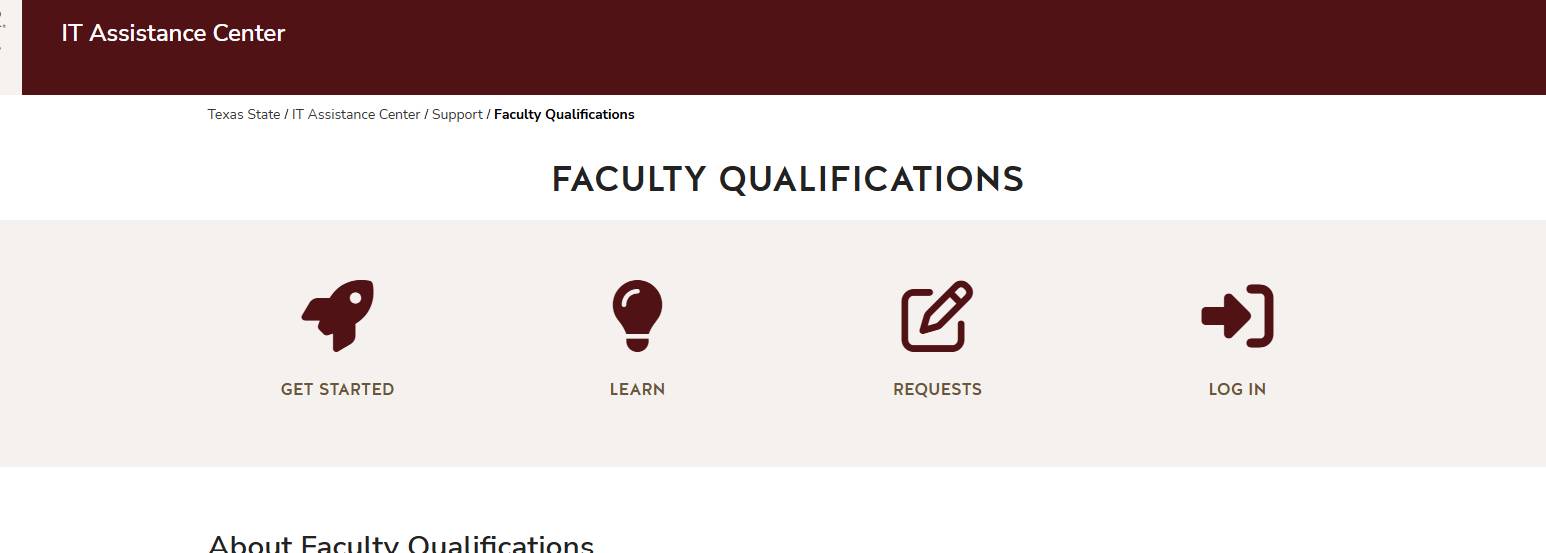
STEP #2: SCROLL PAST “Teaching” to the bottom of the page and under Annual Review, click Annual Review Narratives. (Do not use the “Teaching” section for your annual review).
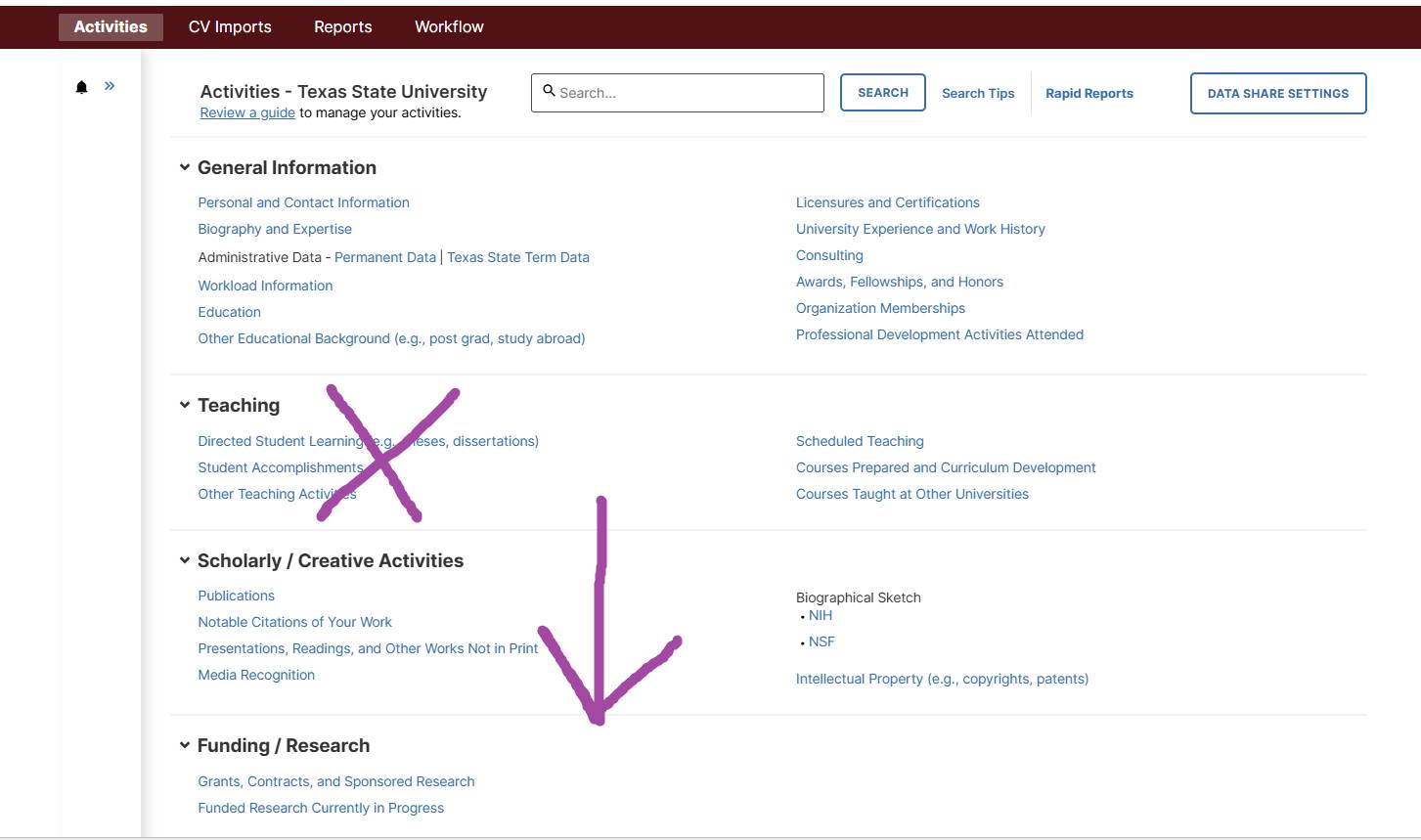
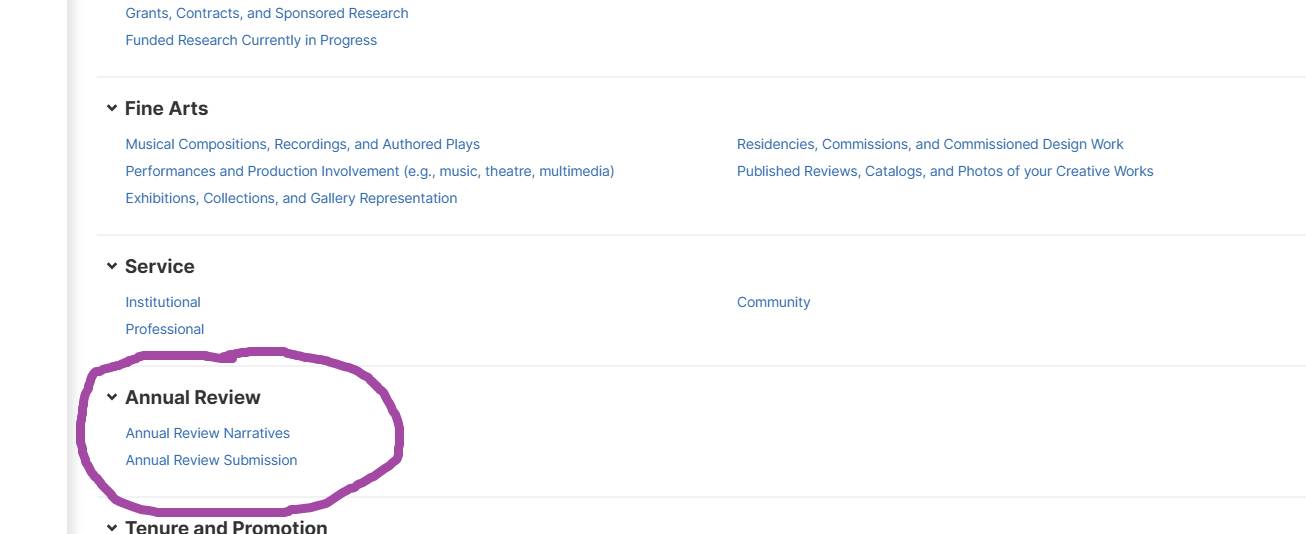
STEP #3: Click “Add New.” For Year Under Review, type 2025.
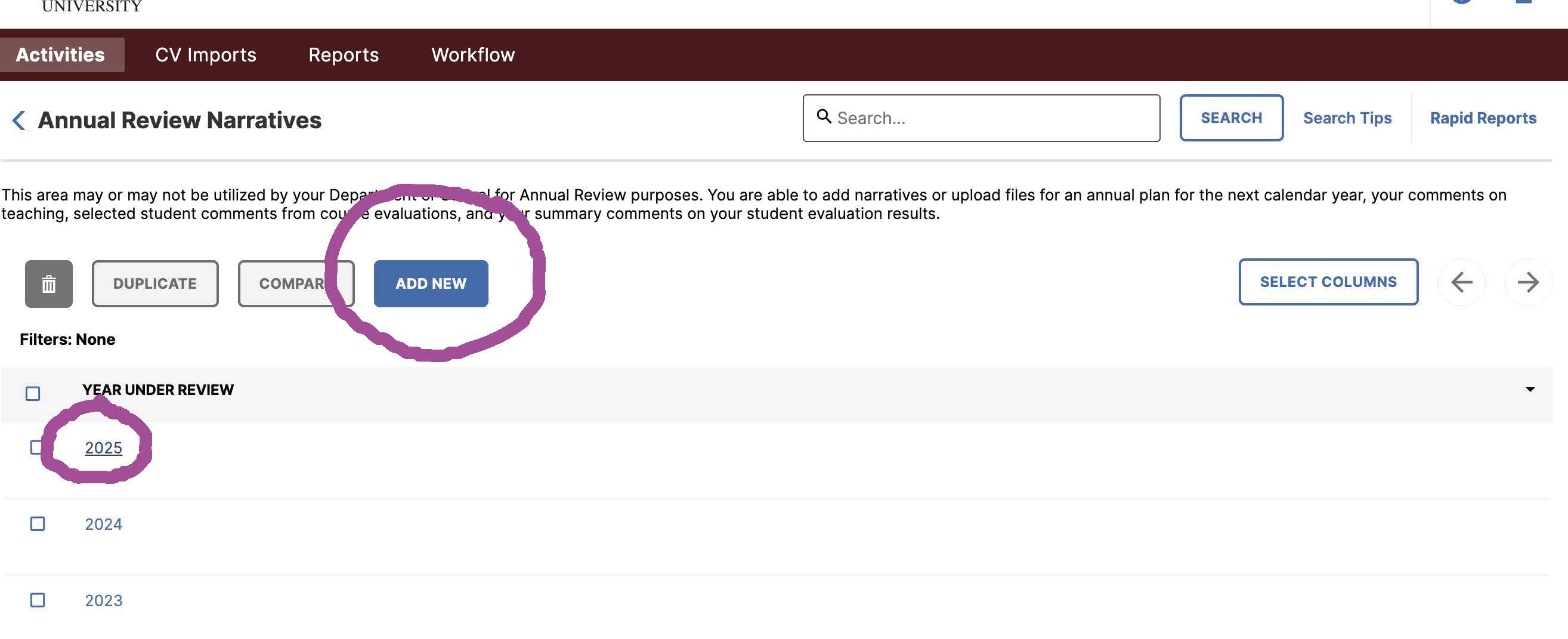
STEP #4: Skip Annual Plan for Upcoming Year.
STEP #5: Type/paste in your Comments on Teaching for Year Under Review. DO NOT attach files. You're writing ONE essay of 450-500 words that covers teaching and student evaluations.
STEP #6: Skip Upload Comments on Teaching.

STEP #8: Skip Summary Comments on Student Evaluations for Year Under Review.
STEP #9: Skip Instructor Comments.
STEP #10: Click Save.
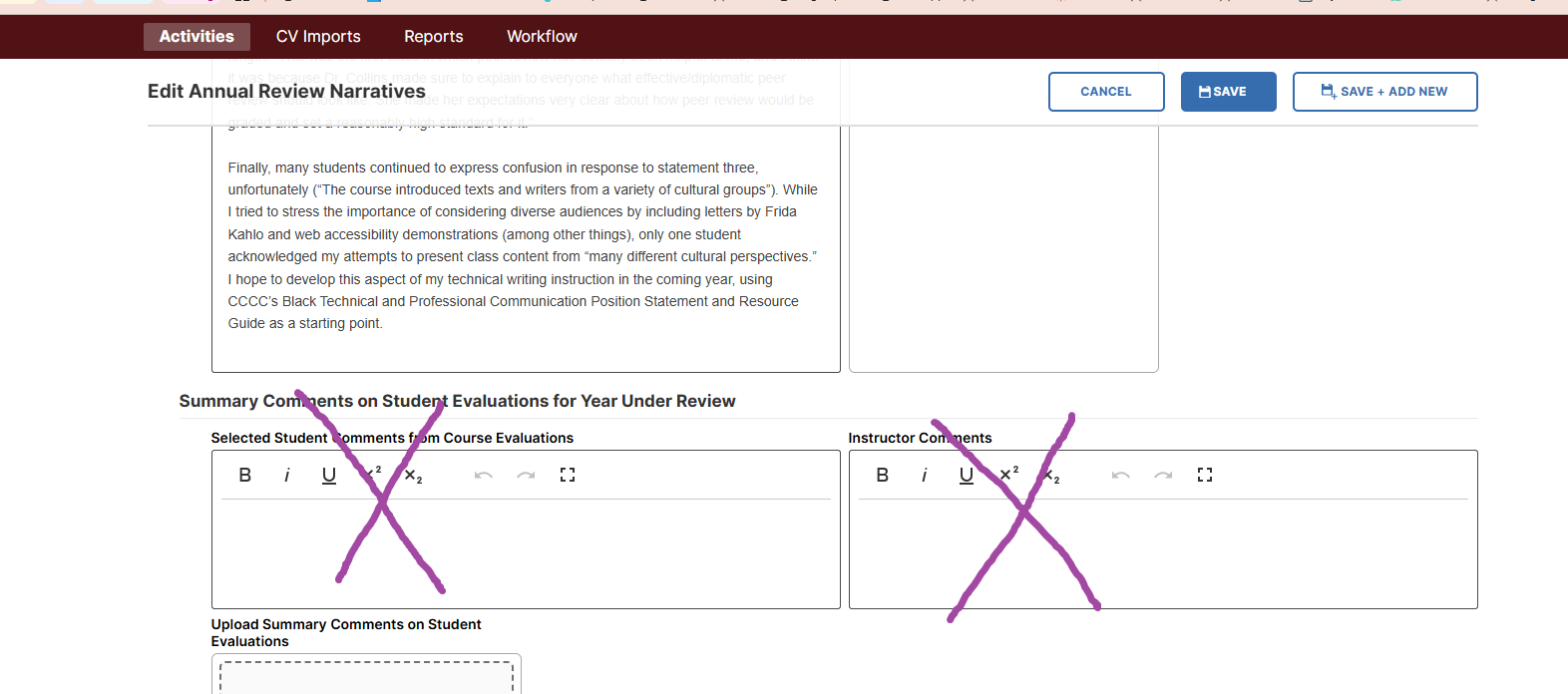
II. The bulleted list of service
#11: You will not paste in your service bulleted list on the first page in Digital Measures/Faculty Qualifications. Instead, you need to run Workflow.
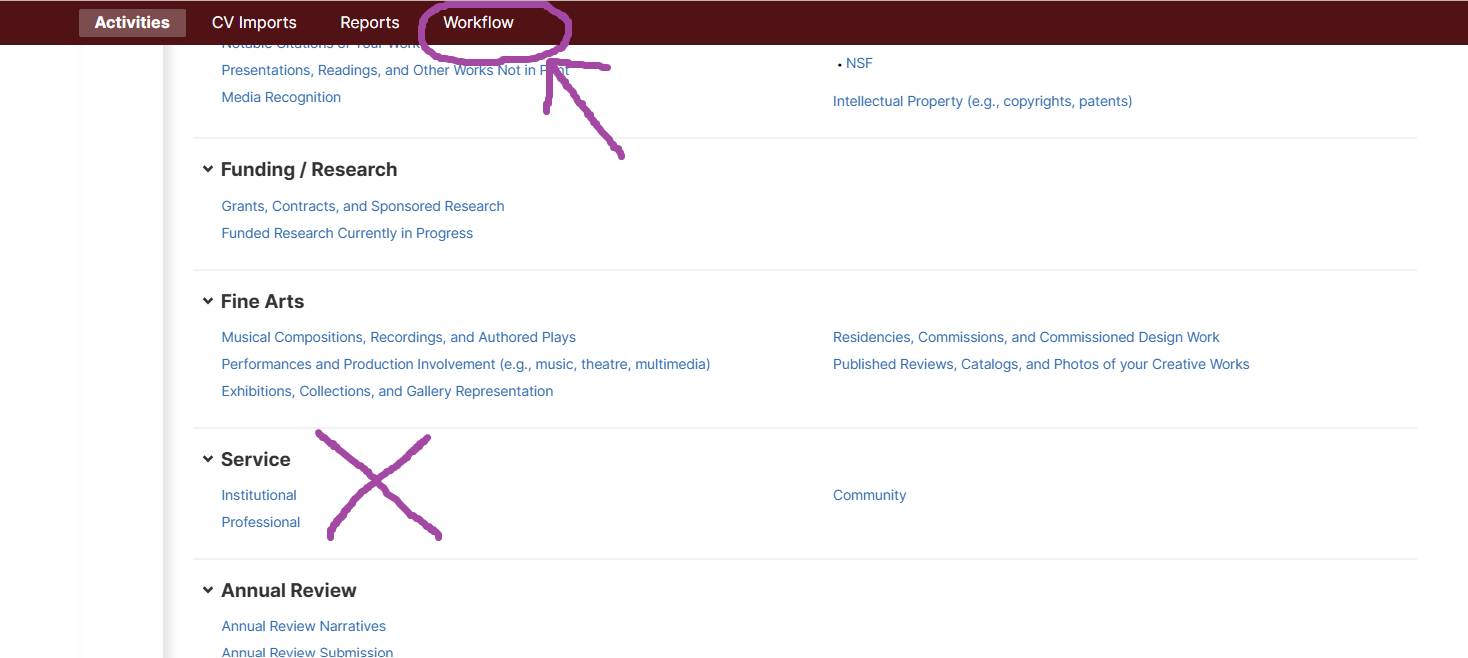
#12: Once you submit your teaching narrative, a text box will pop up for your service bulleted list. Paste the bulleted list in. Do not submit a file.
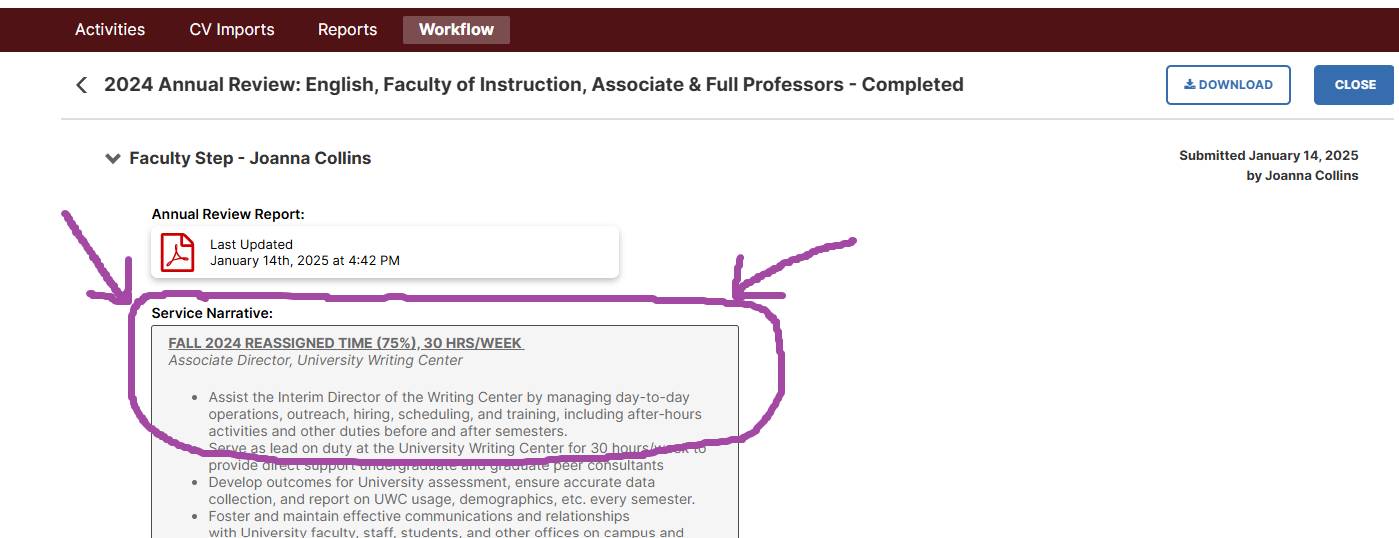
To submit your annual review . . .
- Click Workflow.
- From your Inbox, click FOI Annual Review.
- Check to make sure your report is current. If not, hit Refresh Report.
- Click the PDF icon next to the report. The report will open, and you will be able to review it.
- If you need to make changes, click Manage Activities, make your corrections/additions, and begin the submission process anew. Be sure to click Refresh Report to reflect these changes.
- Return to the Workflow task.
- Click Save to save your progress and return later. Click Submit to submit your report. Submissions are final. Resubmissions require system administrator intervention.
-
Sample FOI Annual Review Teaching Narratives and Service Bulleted Lists
-
Shannon Shaw's Annual Review 2024
Teaching
In 2024, I piloted three new assignments for 1321. The first was an environmental policy proposal for the city of San Marcos. The proposal included an executive summary, overview, discussion of alternatives, recommendation, and implementation. I received thoughtful, detailed, and thorough proposals, some of which I recommended students submit to the Writing Center essay contest. Additionally, students generally liked the assignment as one student wrote, “the policy proposal assignment was unique and very enjoyable.”The second pilot lesson, Graphing the Human Footprint, involved students graphing and interpreting climate data. Using historical data points, students graphed metrics associated with climate-change causes such as CO2 concentration, species extinctions, number of motor vehicles, GDP, energy consumption, and others. We discussed as a class what the data indicated, and they wrote about their findings. In another new major assignment, students conducted a sustainability literacy interview. After the first few weeks of learning sustainability basics, the class generated fifteen questions to ask their peers or family members. They then wrote an analysis and reflection about the state of general sustainability literacy. While both assignments engaged students, they could be more robust and more specifically related to course goals. One student summed the class up well, “This course should be required for all students because sustainability is necessary for the future of the entire world, and everyone in it. 100000/10 course.”
Two lessons for 1320/1321 that are old and not engaging for students anymore are ones for in-text citations and works cited page generation. Over the years, I’ve revised the lessons to include Writing Across Disciplines: different writing styles such as APA and Chicago, types of information they prioritize, and how they dictate writing style rules. I’ve also added information about qualitative and quantitative research. However, this spring I will have students practice APA style in their policy proposal and practice qualitative research methods in their literacy interviews.
Even though my citation and works cited lessons need updating, my focus on research practices made an impact on my students. One student wrote, “I have learned how to do research before writing an essay, and the importance of a rough draft.” Another wrote, “My approach to research has improved and become more organized because of this class.” Finally, when asked if the course improved their skills and increased their knowledge, one student replied, “fo sho.”
As I wrote in last year’s Annual Review, I had issues with some Tech Writing students failing to understand the concepts of systems thinking. As a project management tool for mitigating or eliminating problems in professional processes, Systems Thinking is important for Tech Writing students to understand and practice. The daily grades completed before the major assignments seemed to be where they struggled to understand. I left extensive comments on these low-stakes assignments; the comments I made were mostly clarifying and using their own examples as a guide for how to apply the concepts. Having them review my comments on the low-stakes assignments helped them successfully implement the concepts in the major assignment.
Service
Spring ’24 Service
Nontenure Line Faculty Committee (NLFC): 10 hrs
- Met once a month for two hours to discuss the FOI policies and implementation
- Discussed FOI policy development with nontenure colleagues and department chair and brought their concerns back to the committee
- Shared with NLFC concerns from English FOI committee and vice versa
- Reviewed and graded course release applications for nontenure faculty
English FOI Policy Review Committee: 3 hrs
- Reviewed and edited FOI placement policy
- Met to discuss FOI placement policies
- Shared with FOI committee concerns and discussion from NLFC
Bobcat Day Committee: 4 hrs
- Spearheaded the design and creation of English department swag (400 bracelets)
- Dropped off supplies afternoon before and set up English department table the day of event
- During the event, talked with perspective students and their parents, passed out bracelets and other swag, and helped future students decide the best English courses to take for their degree plan
Bobcat Build: 4 hrs
- On a Saturday, in assigned groups, helped clean up the yard and complete home repairs of a participating community member
Fall ’24 Service
Bobcat Day Communications and Publicity Taskforce Committee: 2 BC days = 8 hrs
- Represented the department at prospective and admitted student events
- Managed materials the day before and day of event
- Coordinated with members of Communications and Publicity committee for messaging and branding
- During event, talked with perspective students and their parents, passed out bracelets and other swag, and helped future students decide the best English courses to take for their degree plans
FOI Teaching Observations: 3 hrs
- Helped develop observation procedures and rubrics
New Annual Review Procedures: 4 hrs
- Workshopped new annual review guidelines
- Workshopped service descriptions
-
Jessica Martinez's Annual Review
Annual Review 2024 - Jessica Martinez
My 1320 students write a five-to-seven-page argumentative essay with at least five credible sources and one counterargument. I broke the essay into four sections—planning, researching, outlining, and peer reviewing—so that students could more easily develop topics and claims. One student commented, “This course improved my ability to write, and improved my ability to properly prepare before writing an essay.”
This semester, I added more classes that focused on why the annotated bibliography was necessary and how to structure it. One 1320 student commented, “A major challenge I had within the course was creating an annotated bibliography. I never made one before, so I had to overcome the difficulties with learning something new.” While most students found learning MLA tedious, I believe framing the annotated bibliography as a means of “showing one’s work” helped them realize that researching and proper documentation is a crucial part of the writing process.
Last semester, a student in my 1320 wrote, “a lot of the classes were repetitive and covered the same content over and over again.” I believe this was the result of group presentations I assigned over the five types of arguments in our textbook, Everything’s an Argument. I noticed attendance and class participation declining as soon as students completed their presentation. However, this semester, I assigned chapter reviews of the five types of arguments. Students took the review home and completed it while reading the assigned chapter. This improved class participation while also helping students understand how to structure their classical argument essay. One of my main goals this semester was to improve attendance in my 1320 classes, so I implemented a bonus points policy in which students earned points towards their overall grade at the end of the semester. This motivated students to attend more than in the past.
While teaching 3315 in Fall 2023, I realized that I wanted to give students more time to draft for their workshops. This semester, I had the opportunity to teach 3348. I decided to use George Saunder’s A Swim in a Pond in the Rain and Jennifer Egan’s A Visit from the Goon Squad for the first half of the class. Saunder’s book introduced students to structure, form, and theory, while Egan’s reinforced the elements of craft. This led to great class discussions while giving students time to write for their workshops. Students were assigned a craft analysis essay in which they had to write about two modern short stories. I previously assigned this in 3315, though, most students approached this essay as a literature paper and did not write about contemporary stories. For 3348, I gave them a list of over twenty recently published stories to write about. I received positive feedback about the stories, and students said they were excited to incorporate similar elements of craft in their fiction.
Fall 2024 Service and Committees
- First Gen Committee Member (3 hours):
- Attended First Gen Mixer on April 11th from 6:00pm to 8:00pm
- Met with the First Gen committee on Sept 20, 2024 from 12:00-1:00pm. Discussed and planned upcoming events for First Gen Week.
- Discussed possible collaboration with the MFA department to create a nonfiction workshop for students submitting personal narratives for the First Gen essay contest.
- New Lecturer Support Committee Member (3 hours):
- Attended the welcome meeting and met with my mentee on August 22nd from 11am to 12:00pm.
- Attended the New Lecturer Support Committee Mixer on Thursday, November 21st from 5:00pm-7:00pm
- Bobcat Day Committee Member (4 hours):
- Participated in Bobcat Day on November 23rd from 8:00am-12:00pm.
- Spoke with potential Texas State students and their families.
- Helped future students decide which English courses to take.
- Passed out Texas State swag bags to potential students
- New Annual Review Procedures (4 hours):
- Workshopped new annual review guidelines
- Workshopped service descriptions.
- First Gen Committee Member (3 hours):
-
Mark Hernandez's Annual Review
Annual Review 2024 – Mark Hernandez
In all my First-Year English courses, peer review is one of my ongoing revision goals. One way that I emphasized the significance of peer review is by doing smaller workshops on minor assignments (such as introductions, reader response assignments, and in-class writing) in addition to the main ones for the major papers. The smaller workshops served as a practice run, and I reminded them that peer reviews help make them better readers and writers. I also gave guiding questions with the smaller peer reviews. Most of the students said they felt more confident presenting their work to others through these low-stakes assignments. Because they had already done smaller peer reviews, the major paper peer reviews seemed more engaging; the students did a better job discussing the drafts and left better comments. Throughout the semester, I constantly reminded them that revision is an important part of the writing process, so I also gave them the opportunity to revise after meeting with me.
I added some additional in-class, hand-written prewriting components to each major essay to combat the rise of AI. Each essay unit included an essay plan, several smaller in-class writing assignments, followed by a rough draft, and ending in the final draft and a reflection. This not only helped them with revising, but also with time management because the smaller assignments could be revised into the final essay. One student writes that “the slow build up with the essays … really helped me be prepared.” The smaller assignments and in-class writing kept the students on track with deadlines and many students commented that they didn’t feel as overwhelmed and didn’t procrastinate as much as they typically do.
In 2330, most of the students made excellent connections and thoroughly answered prompts designed to make connections to various texts throughout the semester. One student writes, “This course was challenging, and it did require creative thinking. The class required creative and active discussion in-class, which motivated students to participate and read the texts provided. Exams and essays required students to think creatively in their responses.” Additionally, while I do hold a peer review and discuss writing about literature, it would be beneficial to dedicate a bit more time to this since these courses are writing intensive. One student comments that they would’ve liked “[b]etter workshops and advice in order to improve our writing on the papers.” One goal next time I teach this course is to focus a bit more on the process on writing about literature. Typically, I do have a lesson and some in-class writing assignments focused on paragraph structure and writing about literature; however, I would like to expand this further by incorporating a more variety of writing assignments that are connected to the papers.
Spring 2024 Service:
Bobcat Day Committee (34 hours):
- Helped making of 400 bracelets for English department swag
- Dropped off supplies the afternoon before and set up the English department table
- During the event, interacted with prospective students and parents, passed out bracelets and other swag, discussed with future students’ English courses to align with their degree plan
Alumni Awards Day (2 hours):
- Attended the Alumni Awards Day in LBJ Ballroom
First-Gen Mixer (3 hours):
- Attended the First Gen Mixer in Flowers Hall 230
- Arrived early to help set up and stayed for the event
Commencement (3 hours):
- Attended the College of Liberal Arts commencement ceremony
Fall 2024 Service:
New Lecturer Support Committee (4 hours):
- Met with my mentee at the beginning of the semester
- Helped organize the Lecturer Support Committee Social in San Marcos
Nontenure Line Faculty Committee (NLFC) (14 hours):
- Met once a month for 2 hours with other members across the University to discuss FOI policies
- Attended Faculty Senate meetings
- Discussed concerns from NLFC with other English faculty and vice versa
- Joined a subcommittee, which met twice (1 hour each) and is currently reviewing the Nontenure Promotion Policy sent from the Provost’s Office
- Had meetings with other faculty members regarding this new policy
Department Promotion Policy Committee (2 hours):
- Attended the Faculty Senate meeting for policy discussion
Bobcat Day Committee (10 hours):
- Dropped off supplies the afternoon before and set up the English department table
- Interacted with prospective students and parents, passed out bracelets and other swag, discussed with future students’ English courses to align with their degree plan
Wordplay Poetry Club (4 hours):
- Co-faculty advisor
- Rotated meetings with other faculty members
- Attended four meetings this fall
New Annual Review Procedures (5 hours):
- Workshopped new annual review guidelines
- Workshopped service descriptions
-
